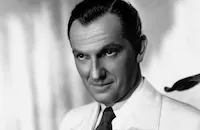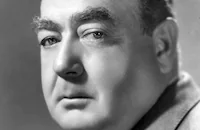The Cheaters

Brief Synopsis
Cast & Crew
Joseph Kane
Joseph Schildkraut
Billie Burke
Eugene Pallette
Ona Munson
Raymond Walburn
Film Details
Technical Specs

Synopsis
The week before Christmas, New York business tycoon James C. Pidgeon is facing bankruptcy due to the extravagant spending of his wife Clara. At his office, J. C. is pestered by his jovial, good-for-nothing brother-in-law, Willie Crawford, but is cheered by a telegram from his son Reggie, who informs him that J. C.'s rich uncle is on his deathbed. Believing that his financial problems will soon be solved, J. C. accompanies Willie home, where Clara is supervising preparations for Christmas. Also at home is Therese, the Pidgeon's snobbish elder daughter, who is determined to make her unconventional family presentable for her socially prominent fiancé, Stephen Bates. Therese insists that the family take in a "charity case" for the holidays in order to impress Stephen. Reluctantly giving into Therese's whims, her parents bring home a charity case advertised in the newspaper as "Mr. M." The mystery man turns out to be Anthony Marchaund, a once-renowned actor who became a drunkard and handyman after being injured in an auto accident ten years earlier. Admonished by a newspaper official to be grateful, Marchaund charms the family with his polite, refined manners, although one afternoon he drinks too much and is hidden by the butler, MacFarland, until he recovers. While Marchaund is resting unseen on the couch, the family discovers that their eccentric uncle has died and left his five-million-dollar fortune to an actress whose performance as "Little Eva" in Uncle Tom's Cabin impressed him thirty years previously. Knowing only that the actress' last name is Watson and that she may live in New York, the uncle ordered that if she was not found, the inheritance would revert to J. C. Desperate for the money, J. C. persuades the estate's lawyer to conduct only a week-long search for the actress. Marchaund then makes his presence known and suggests contacting the Actors Equity Assocation for help. Fearing that Marchaund will try to blackmail them, the family promises to "take care" of him if he helps them, and he easily locates the actress, Florie Watson. Willie and Marchaund visit Florie, who is so broke that she accepts Willie's contrived story that she is their long-lost cousin with whom they wish to spend Christmas. Therese is furious that the family has complicated her Christmas plans with Stephen, but Angela, the younger daughter, is charmed by Florie's open, good-hearted nature. J. C. has no intention of telling Florie about her inheritance, and in order to keep her away from the increasing amount of publicity about the unusual will, the Pidgeons take her to one of J. C.'s rental properties in the country. Stating that it belonged to a deceased aunt, the Pidgeons take Stephen, Florie and Marchaund to the cabin, although the unhospitable conditions prompt the servants to quit. Florie takes charge of the cooking and housekeeping, and soon even Clara and Angela are enjoying their chores. Florie, who has fallen in love with Marchaund, urges him to quit drinking and return to the stage, but Marchaund demurs, insisting that he is a has-been. Two detectives, seeking to notify Florie about her inheritance, trace her to the cabin, but the Pidgeons and Marchaund dissuade them from searching the property. Later, as the family glumly sits around the fireplace on Christmas Eve, Marchaund's uneasy conscience prompts him to try to help Florie. Hoping to inspire the family to tell the truth, the drunken actor terrifies them with a stirring rendition of A Christmas Carol , then collapses. The Pidgeons, who have grown fond of Florie, are ashamed of their greed, and tell her about her inheritance. Florie is stunned, but forgives her friends for their deception, and the reformed Pidgeons enjoy the rest of the evening. The next morning, Florie tries to thank Marchaund, but instead finds a note in which he confesses his feelings for her, but contends that he must leave. Florie goes to the nearest bar and there finds Marchaund. She tells him that she is splitting the inheritance with the Pidgeons, and the happy couple laugh as they realize that they do not have enough cash to pay for their drinks.

Director
Joseph Kane
Cast

Joseph Schildkraut

Billie Burke

Eugene Pallette

Ona Munson

Raymond Walburn

Anne Gillis
Ruth Terry
Robert Livingston
David Holt
Robert Greig
St. Luke's Choristers
Norma Varden
Hal Taliaferro
Cyril Ring
Virginia Carroll
Jack O'shea
Charles Sherlock
Demetrius Alexis
Joy Harrington
Charlotte Treadway
Joy Gwynell
Jack Daley

William B. Davidson
Al Murphy

Byron Foulger
Crew
Thomas A. Carman
Franz Gruber
Virgil Hart
Frances Hyland
Frances Hyland
Joseph Kane
Russell Kimball
Reggie Lanning
Howard Lydecker
Theodore Lydecker
Bob Mark
Joseph Mohr
Adele Palmer
Lewis Physioc
Albert Ray
John Russell
Gordon C. Schaefer
Walter Scharf
Otto Siegel
Fred Stahl
John Stransky Jr.
James Sullivan
Richard L. Van Enger
Howard Wilson

Videos
Movie Clip
Hosted Intro
Film Details
Technical Specs

Articles
The Cheaters
Republic had picked up Frances Hyland and Albert Ray's original story in 1941 as a vehicle for Binnie Barnes, a beautiful actress and sophisticated comedienne who played supporting roles at major studios and leading roles for lesser studios, including Republic. By the time The Cheaters went into production, however, Ona Munson had inherited the role of an aging actress left a fortune by a wealthy eccentric who had seen her as a child actress in Uncle Tom's Cabin. The former musical star (she had starred in the original production of No, No, Nanette) was best known for playing Belle Watling in Gone with the Wind (1939). In fact, she was haunted by the role, so identified with it that she had trouble landing other good parts. Her consolation was radio, where she became CBS' first female producer, shepherding 17 young women through a weekly show in support of the war effort Victory Belles. That left her little time for film work. The Cheaters was her first picture in two years, following a supporting role in Republic's 1943 Roy Rogers Western Idaho.
That earlier film may have created the connection that won Munson her role in The Cheaters. Director Joseph Kane, who spent most of his career directing Westerns and serials, was an unlikely choice to helm the studio's out-of-character Christmas picture. The only other connection with Republic's more typical offerings was ingénue Ruth Terry, cast as the daughter. The former vaudeville and nightclub star had worked briefly at 20th-Century-Fox before signing a contract with Howard Hughes in 1940. With few productions on his slate at the time, Hughes soon sold her to Republic, where she first appeared in the musical Sing, Dance, Plenty Hot (1940) before becoming a leading lady opposite such cowboy stars as Roy Rogers and Gene Autry.
With such an atypical project on its hands, Republic had to look outside its contract ranks for most of the leading roles. Schildkraut, a stage star in the U.S. since he starred in the first production of Ferenc Molnar's Liliom (later the inspiration for Rodgers and Hammerstein's musical Carousel) was primarily a supporting player by the 1940s. Yet it was his wit and sophistication that made him the perfect choice for the forgotten man who turns out to be a faded stage star. Like Munson, he had largely been absent from the screen previously, though his work was mostly on Broadway, where he recently had starred opposite Eva La Galliene in a revival of Chekhov's The Cherry Orchard.
Just as perfect was the casting of the rich eccentrics who, in a very un-Christmas-like mood, plot to swindle Munson out of her inheritance. In the hands of Billie Burke and Eugene Pallette, however, it was all good scatter-brained fun. Burke, best known today as Glinda the Good in The Wizard of Oz (1939), had virtually trademarked the role of the dizzy society matron after a long career as a stage star. She had established herself in such roles at MGM, where she had been under contract until 1941. Since then she had been working freelance and trying unsuccessfully to reestablish herself as a Broadway star. As her husband, Pallette drew on his talent for exasperation and one of the screen's deepest voices. Although one of the most successful character actors of the decade, he was only two films away from retirement. Plagued by ill health, he finished his career at low-budget studios like Republic and Monogram. Then, driven by right wing paranoia, he responded to the start of the Cold War by moving to a bombproof home in Oregon.
The Cheaters enjoyed two lives at the box office. Republic re-edited the film and re-released it in 1949 under a new title, The Castaway. When the studio sold its library to television in the 1950s, it became a Christmas staple, fondly remembered by fans even after it was supplanted by more recent holiday films.
Producer-Director: Joseph Kane
Screenplay: Frances Hyland
Based on a story by Hyland and Albert Ray Cinematography: Reggie Lanning
Music: Walter Scharf
Art Direction: Russell Kimball, James W. Sullivan
Cast: Joseph Schildkraut (Mr. M), Billie Burke (Mrs. Pidgeon), Eugene Pallette (Mr. Pidgeon), Ona Munson (Florie), Raymond Walburn (Willie), Ann Gillis (Angela), Ruth Terry (Theresa), Norma Varden (Mattie, Mr. Pidgeon's Secretary).
BW-87m.
by Frank Miller

The Cheaters
Quotes
Trivia
Notes
The working titles of this film were The Amazing Mr. M., The Magnificent Mr. M., Mr. M. and the Pidgeons and The Magnificent Rogue. A December 1941 Hollywood Reporter news item reported that Republic had purchased Frances Hyland and Albert Ray's original story as a vehicle for actress Binnie Barnes, and in August 1942, Hollywood Reporter noted that Joseph Santley was set to direct the film, and Robert North was to produce. December 1944 Hollywood Reporter news items announced that Brad Taylor and James Lydon would have roles in the picture, but they do not appear in the released film. Although Hollywood Reporter production charts include Rex Lease in the cast, his appearance in the completed film has not been confirmed. In 1949, the picture was re-edited and re-released as The Castaway.
















